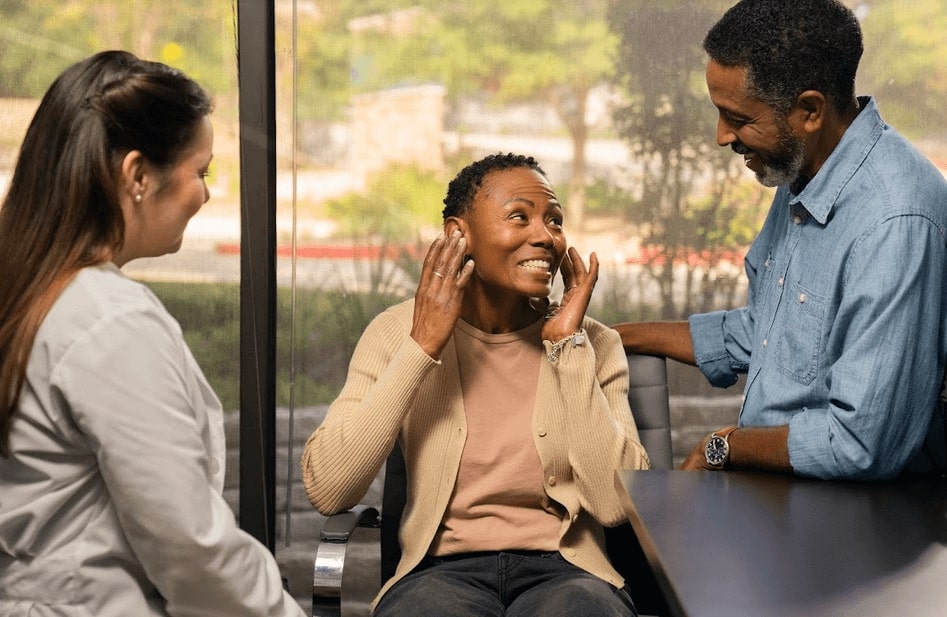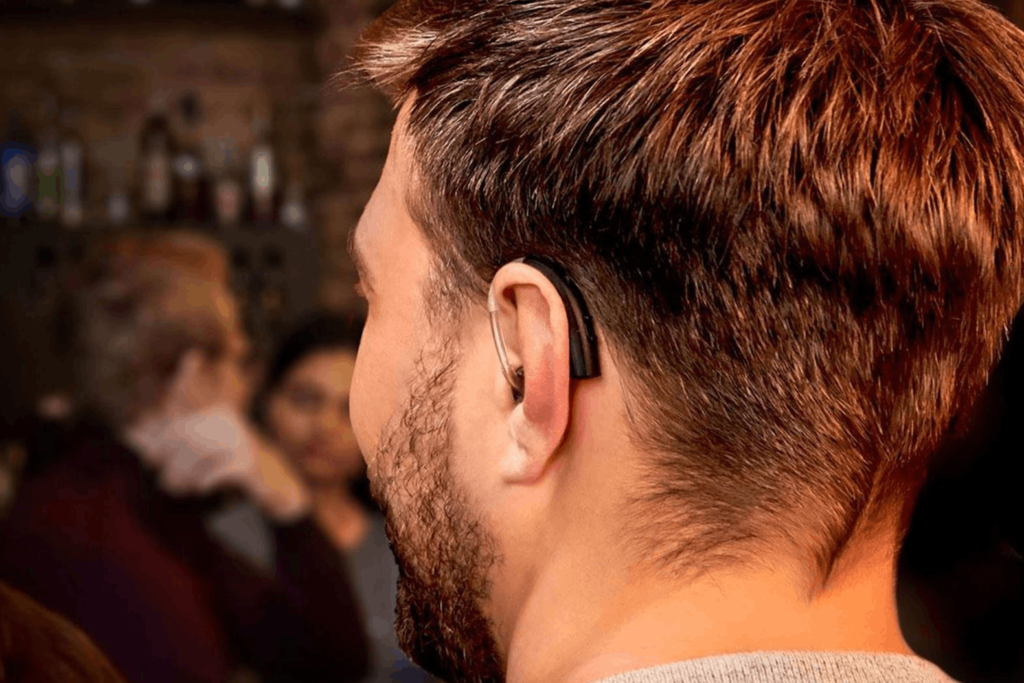Mon - Fri 8:30 - 16:00
Marelie Gous Audiologists Inc, The Hearing Clinic, 6 Avocet Corner, Hazeldean Office Park, Pretoria.
Hearing loss makes it hard to hear, affects your confidence, memory and quality of life.
Hearing loss is a partial or complete loss of the ability to hear sounds in one or both ears. It can be caused by a variety of factors, including aging, exposure to loud noises, infections, genetic factors, and certain medications.
Hearing loss can range from mild, where a person may have difficulty hearing certain sounds or in certain situations, to severe, where a person may not be able to hear anything at all. It can also be temporary or permanent.
Hearing loss can have a significant impact on a person's quality of life, affecting their ability to communicate, socialize, and perform daily activities. It is important to identify and treat hearing loss as early as possible to prevent further damage and improve overall quality of life.

People with hearing loss may have difficulty understanding spoken language, especially in noisy environments or when multiple people are speaking at once. This can lead to social isolation and communication barriers in both personal and professional relationships.

Hearing loss can affect a person’s emotional well-being, leading to feelings of frustration, depression, and anxiety. It can also impact their ability to enjoy social activities, hobbies, and other everyday experiences.

Studies have shown a link between hearing loss and cognitive decline, including memory loss, and decreased mental sharpness. This may be due to the increased cognitive load required to understand speech and sounds when hearing is impaired. Hearing loss also causes the aging brain to shrink more quickly.

Hearing loss can make it difficult to perform certain job functions, especially those that require communication or interaction with others. This can impact job opportunities and career advancement.
The prevalence of hearing loss increases with age, with around 1 in 2 adults over age 65 experiencing hearing loss (World Health Organisation, 2021).
Men are more likely than women to experience hearing loss.
Noise-induced hearing loss is becoming more prevalent, especially among young people who are exposed to loud noises through headphones and music concerts.
Hearing loss can affect children as well, with around 34 million children worldwide experiencing disabling hearing loss.
It's important to note that hearing loss is a common and treatable condition, and seeking early diagnosis and treatment can help prevent further hearing loss and improve quality of life.

The symptoms of hearing loss can vary depending on the type and severity of the hearing loss. Here are some common symptoms to look out for:

This is often one of the first signs of hearing loss. You may have trouble hearing or understanding conversations, especially in noisy environments or when more than one person speak at the same time.
Sounds may seem unclear or muffled, making it difficult to distinguish words or understand what is being said.
You may have difficulty hearing high-pitched sounds or distinguishing between certain consonant sounds, like “s” and “f”.
You may find that you need to turn up the volume on the television, radio, or phone to hear sounds clearly.
This is a ringing, buzzing, or hissing sound in the ears that is not caused by an external noise. Tinnitus can be a symptom of hearing loss.
If you are having difficulty hearing and understanding conversations, you may start to avoid social situations or feel isolated from others.
If you are experiencing any of these symptoms, it is important to schedule a hearing test with one of our audiologists. Early diagnosis and treatment can help prevent further hearing loss and improve your quality of life.
There are several potential causes of hearing loss, which can be divided into two main categories: conductive hearing loss and sensorineural hearing loss.

Conductive hearing loss occurs when sound waves are not conducted properly through the ear, and can be caused by:
Sensorineural hearing loss occurs when there is damage to the inner ear or auditory nerve, and can be caused by:
It’s important to note that there are many potential causes of hearing loss, and that the underlying cause can vary depending on the individual and their specific situation. The purpose of a hearing test is to determine a possible cause for hearing loss as a guideline for treatment options.
Untreated hearing loss can have several negative consequences on a person’s quality of life, including:

Individuals with hearing loss may find it difficult to communicate effectively with others, leaving them feeling unhappy, left out of conversations and less confident. This may lead to social isolation and withdrawal.
Research has suggested that untreated hearing loss may be associated with a higher risk of cognitive decline and dementia. It can also affect mental sharpness.
Hearing loss can lead to feelings of frustration, anxiety, and depression, particularly when it interferes with social interactions or daily activities.
Hearing loss can affect job performance and career prospects, particularly in professions that require effective communication.
Communication difficulties caused by hearing loss can lead to strain on personal relationships, including with family members and friends.
There are several solutions for hearing loss, depending on the cause and severity of the condition. Here are some common solutions:

Hearing aids are small electronic devices that amplify sound, making it easier for people with hearing loss to hear. There are different types of hearing aids available, which are worn behind-the-ear, in-the-ear, or in-the-canal. At The Hearing Clinic you are offered a wide selection of hearing aid brands (10 to be specific) to ensure that you receive personalized, high-quality care and support for your hearing health.
Our audiologists can remove excess earwax by using a surgical tool, called a curet, that lights up. We can also flush out the wax using a syringe filled with warm water and saline. Medicated ear drops may also be recommended to help soften the wax.
Hearing loss caused by ear infections may improve with antibiotics prescribed by a medical professional. Corticosteroids can ease the swelling of cochlear hair cells after exposure to loud noise or severe ear infection.
In some cases, surgery may be necessary to treat hearing loss. This may include procedures to remove obstructions in the ear canal or repair damaged parts of the ear; or placement of ear tubes in the eardrum to treat chronic middle ear infection that contributes to hearing loss.
Assistive listening devices are designed to help people with hearing loss in specific situations, such as watching TV or using the telephone.
Cochlear implants are devices that are surgically implanted into the inner ear to help people with severe hearing loss or deafness. They bypass damaged parts of the ear and stimulate the auditory nerve directly.
It is important to consult with one of our audiologists to determine the best solution for your specific needs.
A full diagnostic hearing test costs R950-00 at The Hearing Clinic or it can be claimed at medical aid rates through your medical aid. We do that on your behalf!
Don’t feel excluded from the conversation! Overcome hearing loss for a happier life and a healthier brain.
EXCELLENTTrustindex verifies that the original source of the review is Google. Marelie gee uitsekende en professionele diens, ek is so tevrede my my nuwe apperate...Posted onTrustindex verifies that the original source of the review is Google. Excellent service from the hearing clinic. From assessment, I was taken through the different types of tests to understand the philosophy of hearing and recommendations of hearing aids. The journey was comfortable and I have a better understanding of hearingPosted onTrustindex verifies that the original source of the review is Google. Give credit where credit is due. My previous hearing aids were upgraded to the Phonak's Audéo Infinity 30 (rechargeable) and by far, thsee Phonak's outweigh the previous devices. Biggest benefits to me are; 1. The Bluetooth connectivity is superb. I am able to connect SIMULTANEOUSLY to my Bluetooth TV transmitter & Samsung cell phone. Now I do not miss a cell ph call while watching TV! 10/10! (Cell call will mute TV and reconnect TV sound after cell call automatically.) 2. Android app (ambient settings) brilliant! What this means is; if you are streaming music from your phone, the previous devices still picked up & amplified all background sounds. The Phonak's app provides a 'slider' - whereby you can slide the amplification to one side, (ie music vs noise) thus muting either input! 3. Clarity and ease of use superb. Marelie deserves full credit for my configuration and the physical fitment of my devices! I look forward to many years of hearing again!Posted onTrustindex verifies that the original source of the review is Google. Passion, expertise and enthusiasm for the profession as well as a compassion for people results in excellence - Marelie is an excellent audiologist! The best in Pretoria! After my consultation she had great patience with me and advice in finding a suitable pair of hearing aids. My hearing problem has been restored and so, also my quality of life. The good ambience made visits to her practice a pleasant experience. The service that I have received from Marelie and The Hearing Clinic is unmatched and exceeded my expectations by far.Posted onTrustindex verifies that the original source of the review is Google. It is a pleasure to go to The Hearing Clinic. They make you feel very welcome there and they are extremely helpful.Posted onTrustindex verifies that the original source of the review is Google. I found the Hearing Clinic in Pretoria outstanding in terms of quality of service, knowledge and friendliness. It was an absolute pleasure to deal with audiologist Chavonne Lotz, a true knowledgeable professional with a wonderful client relationship. The support staff continuously kept me up to date with the paperwork and appointments. I found it a great positive point that I could physically test the hearing aids for a week before I finally made up my mind to buy.Posted onTrustindex verifies that the original source of the review is Google. We are very satisfied with the service. They took their time and solved all our problems and attended to our needs. Thank you ShavonPosted onTrustindex verifies that the original source of the review is Google. All staff very friendly and professional, my broken hearing aid was replaced and the settings done in a very amicable environment. I will definitely refer people to them. You can't get better service anywherePosted onTrustindex verifies that the original source of the review is Google. The Hearing Clinic's Chavonne is simply outstanding. She patiently removed ear wax from both ears. Immediately afterwards I could hear perfectly. The clinic's focus is definitely their patients first and foremost. Thank you Chavonne you made my day, week and life so much better.Posted onTrustindex verifies that the original source of the review is Google. Excellent and professional service, very willing to listen and resolve my issues with patience and care. Thank you much apricated.Verified by TrustindexTrustindex verified badge is the Universal Symbol of Trust. Only the greatest companies can get the verified badge who has a review score above 4.5, based on customer reviews over the past 12 months. Read more